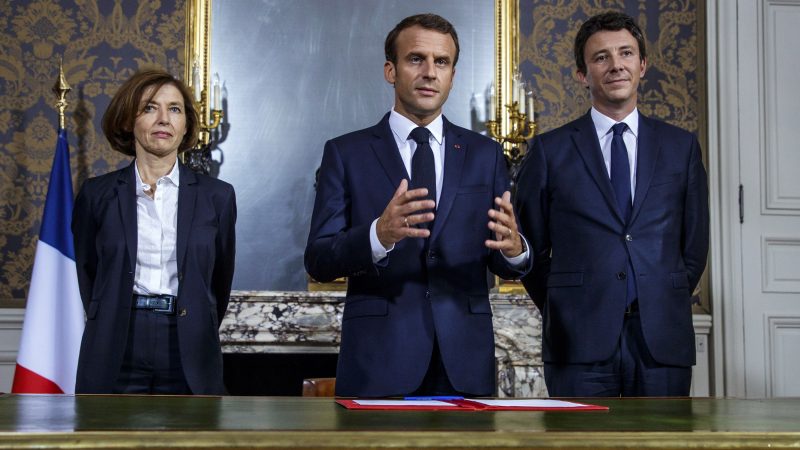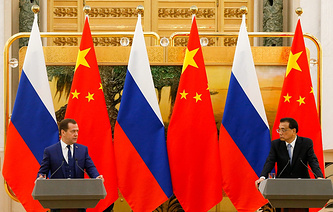
EurActiv (7 November 2018)
French President Emmanuel Macron called on Tuesday (6 November) for a “real European army” to allow the bloc to defend itself against Russia and even the United States, a hugely sensitive idea amongst EU nations which jealously guard their defence.
Macron, who has pushed for a joint European Union military force since his arrival in power, said Europe needed to be less dependent on American might, not least after US President Donald Trump announced he was pulling out of a Cold War-era nuclear treaty.
“We have to protect ourselves with respect to China, Russia and even the United States,” Macron told Europe 1 in his first radio interview since becoming president in May 2017.
“We will not protect Europeans unless we decide to have a true European army.”
Macron has spearheaded the creation of a nine-country European force, independent from NATO, that could rapidly mount a joint military operation, evacuate civilians from a war zone, or provide aid after a natural disaster.
The nine countries’ defence ministers are set to meet for the first time on Wednesday in Paris to start thrashing out details of how the force will operate.
Finland is set to become the tenth country involved in the project, according to a source close to the talks.
Touchy subject
The wider EU is due to vastly expand its defence budget starting in 2021, allocating some €13 billion over seven years to research and develop new equipment.
Under an initiative known as PESCO, 25 EU countries have also pledged to better coordinate their defence spending and potentially their operations.
But talk of an “EU army”, an idea floated by European federalists for years, remains a deeply touchy subject amongst member states anxious to defend their sovereignty.
A French source said Macron was speaking about more closely coordinated defence rather than a truly supranational military spanning the continent.
The president “used the strong image of a ‘European army’ as a reminder” of the need for closer defence ties, the source said.
European Commission spokesman Margaritis Schinas said that the EU backed “a more meaningful and assertive defence identity” but that this cooperation should start with joint research and procurement.
“I don’t think this defence identity will start with an EU army,” he said.
“We have to start with the rest and we’ll see that at some point in time.”
Bruno Alomar, a professor at the French War School which trains top military officers, said Macron’s vision of a tight-knit European defence force was a long way off.
“The idea of creating a common strategic culture is not a bad one,” he told AFP.
“But there’s a massive gap between the European defence that Emmanuel Macron dreams about and the reality of very powerful disagreements between European partners.”
Russian meddling fears
Macron, who is set to host dozens of world leaders on Sunday for commemorations marking 100 years since the end of World War I, said the 70 years of peace enjoyed in Europe could not be taken for granted.
“For millennia, it has never lasted so long,” he said in the interview, recorded Monday night in Verdun, northeast France, as part of a weeklong tour of former battlefields.
Faced with “a Russia which is at our borders and has shown that it can be a threat”, Macron argued: “We need a Europe which defends itself better alone, without just depending on the United States.”
Battle rages over EU defence pact
A diplomatic tussle has broken over the European Union’s flagship defence cooperation pact, amid warnings that the bloc could cut itself off from major allies like the US and post-Brexit Britain.
In another apparent reference to Russia, he insisted that “intrusion attempts in cyberspace and multiple interventions in our democracies” required a united response.
The centrist French leader has been waging a vocal war on nationalism in recent days as he prepares to host leaders including Trump and Russian President Vladimir Putin.
Ahead of European Parliament elections next May – billed by many observers as a battle between Macron-style pro-Europeans and rightwing populists – he said politicians must respond to voters’ fear and anger.
Europe “has probably become too ultra-liberal”, he said, “which doesn’t allow the middle classes to live well”.
French far-right leader Marine Le Pen – one of the targets of Macron’s anti-nationalist tirades – meanwhile accused him of seeking to turn Europe into an empire.
“And it was empires that were at the origin of World War I, not nations,” she told Radio Classique.
No comments yet.
- HUNDREDS OF TONS OF FISH SUDDENLY DIED IN IRAQ, AND OFFICIALS CAN'T EXPLAIN WHY. BUT SCIENTISTS ARE POINTING TO WATER POLLUTION AND WARNING PEOPLE NOT TO EAT THE FISH. Iraq 07.11.2018
- AFTER MACRON, EU EXECUTIVE ECHOES EU ARMY CALL Europe - EU 07.11.2018
-
 RUSSIA AND CHINA HAVE COMMON VIEWS ON SETTLING INTERNATIONAL TRADE, SAYS PM
Asia - Pacific
07.11.2018
RUSSIA AND CHINA HAVE COMMON VIEWS ON SETTLING INTERNATIONAL TRADE, SAYS PM
Asia - Pacific
07.11.2018
- KOSOVO IMPOSES CUSTOMS TARIFFS ON SERBIA, BOSNIA The Balkans 07.11.2018
- ARMENIA’S DEFENSE BUDGET TO GROW BY 26.6% IN 2019 The Caucasus and Turkish-Armenian Relations 07.11.2018
-
25.01.2016
THE ARMENIAN QUESTION - BASIC KNOWLEDGE AND DOCUMENTATION -
12.06.2024
THE TRUTH WILL OUT -
27.03.2023
RADİKAL ERMENİ UNSURLARCA GERÇEKLEŞTİRİLEN MEZALİMLER VE VANDALİZM -
17.03.2023
PATRIOTISM PERVERTED -
23.02.2023
MEN ARE LIKE THAT -
03.02.2023
BAKÜ-TİFLİS-CEYHAN BORU HATTININ YAŞANAN TARİHİ -
16.12.2022
INTERNATIONAL SCHOLARS ON THE EVENTS OF 1915 -
07.12.2022
FAKE PHOTOS AND THE ARMENIAN PROPAGANDA -
07.12.2022
ERMENİ PROPAGANDASI VE SAHTE RESİMLER -
01.01.2022
A Letter From Japan - Strategically Mum: The Silence of the Armenians -
01.01.2022
Japonya'dan Bir Mektup - Stratejik Suskunluk: Ermenilerin Sessizliği -
03.06.2020
Anastas Mikoyan: Confessions of an Armenian Bolshevik -
08.04.2020
Sovyet Sonrası Ukrayna’da Devlet, Toplum ve Siyaset - Değişen Dinamikler, Dönüşen Kimlikler -
12.06.2018
Ermeni Sorunuyla İlgili İngiliz Belgeleri (1912-1923) - British Documents on Armenian Question (1912-1923) -
02.12.2016
Turkish-Russian Academics: A Historical Study on the Caucasus -
01.07.2016
Gürcistan'daki Müslüman Topluluklar: Azınlık Hakları, Kimlik, Siyaset -
10.03.2016
Armenian Diaspora: Diaspora, State and the Imagination of the Republic of Armenia -
24.01.2016
ERMENİ SORUNU - TEMEL BİLGİ VE BELGELER (2. BASKI)
-
AVİM Conference Hall 24.01.2023
CONFERENCE TITLED “HUNGARY’S PERSPECTIVES ON THE TURKIC WORLD"









